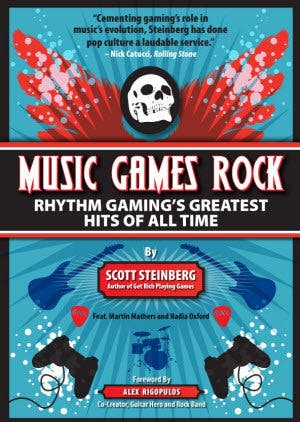Why music games aren't dead
New book predicts a healthy future.
Despite Guitar Hero's bubble bursting earlier this year, the music genre is in great shape and looks set for major growth over the next few years, according to a new book on the genre out this week.
Titled Music Games Rock: Rhythm Gaming's Greatest Hits of All Time, it's written by veteran industry mouthpiece and boss of games consulting outfit TechSavvy Global Scott Steinberg, with a foreword by Harmonix founder Alex Rigopoulos.
In it, Steinberg argues that the recent collapse of the Guitar Hero brand is just a small blip, and that the genre as a whole amounts to much more than just the recent rash of peripheral-based titles.
"Music games have a rich and varied history," Steinberg told Eurogamer.
"They actually date back to nearly the very beginning of video games themselves. Their evolution is intrinsically intertwined with gaming.
"If you think about it, every human being on the planet is wired to love music. Therefore, as music is a common unifier across race, gender, creed, religion, background and ethnicity, music games are a tremendous platform for bringing gaming to the masses."
Steinberg argued that commentators' claims that the genre was on its last legs following the demise of Activision's brand and Viacom's decision to sell off Rock Band developer Harmonix are a long way wide of the mark.
He argued that the sector is actually in rude health, pointing to the recent boom in the dancing game sub-genre with titles such as Ubisoft's Just Dance and Harmonix's Dance Central, as well as 75 million downloads of smartphone smash TapTap Revenge, as proof.
"Music games aren't dead - there's just been a decline in the sales of plastic peripheral-based performance simulation games, as Harmonix founder Alex Rigopoulos likes to call them. Titles that are tied to expensive peripherals have been largely on the wane because users have been downloading so much new music."
However, even those games might not be in as sorry a state as many would have you believe.
"If you look at Rock Band - it's supposedly dead, right? Well, the creators of the game refer to it as a 'platform', not a game. They've sold 100 million digital singles online. A million people still log in each month to buy music for the game. Last time I checked, that still constitutes a platinum hit.
Steinberg added that the genre's future likely lies on social and mobile platforms, rather than on traditional consoles.
"What's happening is, music games aren't falling away, they're simply evolving, going online, going social, like so many other titles. So online, social, mobile - that's the future of music games. It just so happens that many are going to be played on your smartphone, or on Facebook, or using new motion control systems like Move or Kinect.
"If you think about it, the sheer number of smartphones and tablets that are out there right now - we're just hitting the tip of the iceberg when it comes to this market. You've literally got millions, if not billions, of people walking around with ready-made digital jukeboxes right in their pocket.
"So the ability to pull up music, connect online and share music videos or other creations that you've made via Facebook, Twitter, from anywhere in the world - that's extremely powerful and is going to expand the category going forward.
"Look at Harmonix's latest, VidRhythm. You wouldn't necessarily call it a game per se, but it allows you to make music videos on demand and share them with anyone, any time, anywhere. That's powerful.
"If you look at group listening services like Turntable.fm, these are styled like online chatrooms and disguised as group listening serviecse but they're powered by gamification.
"The whole point is to bring together and congregate around the music and make it interactive," he continued. "What's going to happen going forward is music games are going to morph, just as music has morphed over the years."
And that, he argued, could well mean a return for the Guitar Hero brand at some point, albeit in a new guise.
"Even though Activision has benched Guitar Hero, I'll bet you dollars to doughnuts that the fat lady hasn't sung for that franchise yet and we'll be seeing it back again soon, just in different formats," he predicted.
"I would look at new ways to introduce and re-energise the series. Come out with a complete rebranding, base it around new technologies and feature innovations that really generate a groundswell of excitement.
"But I would always, most importantly, be keeping my eye towards online and social. It's tailor made for smartphones and tablets, and absolutely should find its way to Facebook.
"Given the fact that it's the most powerful brand in the category I would also look at leveraging online music sales because really they should be doing what Rock Band has done - creating a platform for constant delivery of new music from top artists, while also creating a platform for users to create and share their own tracks and performances. And find a way to tie it all cohesively together so that you have an experience that lives across a variety of devices."
The book can be read for free online now, as a $2.99 iBook or Kindle purchase, or you can grab a paperback copy for $24.95 from LuLu.com.


